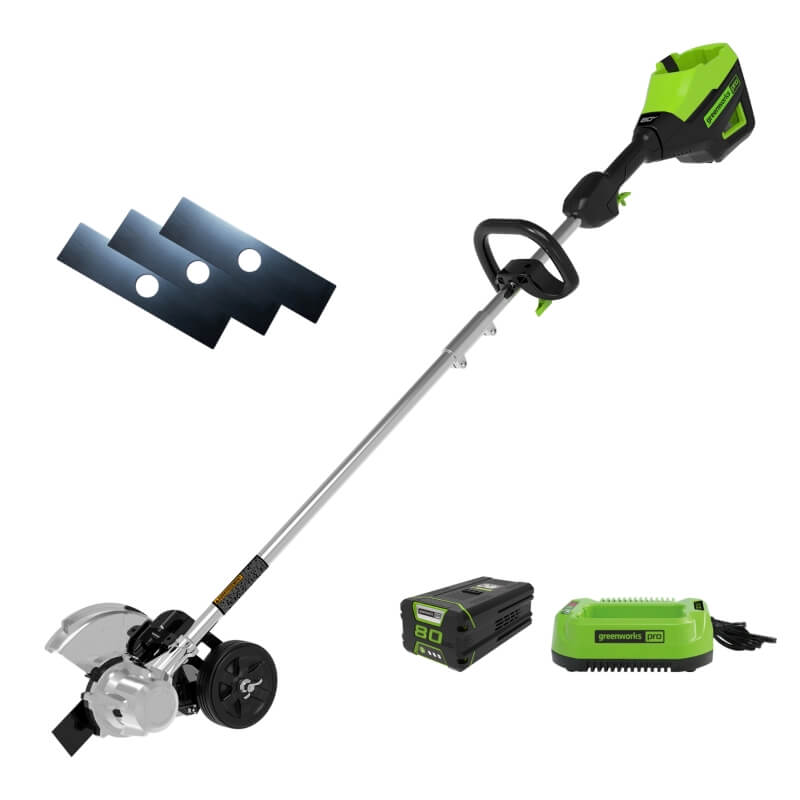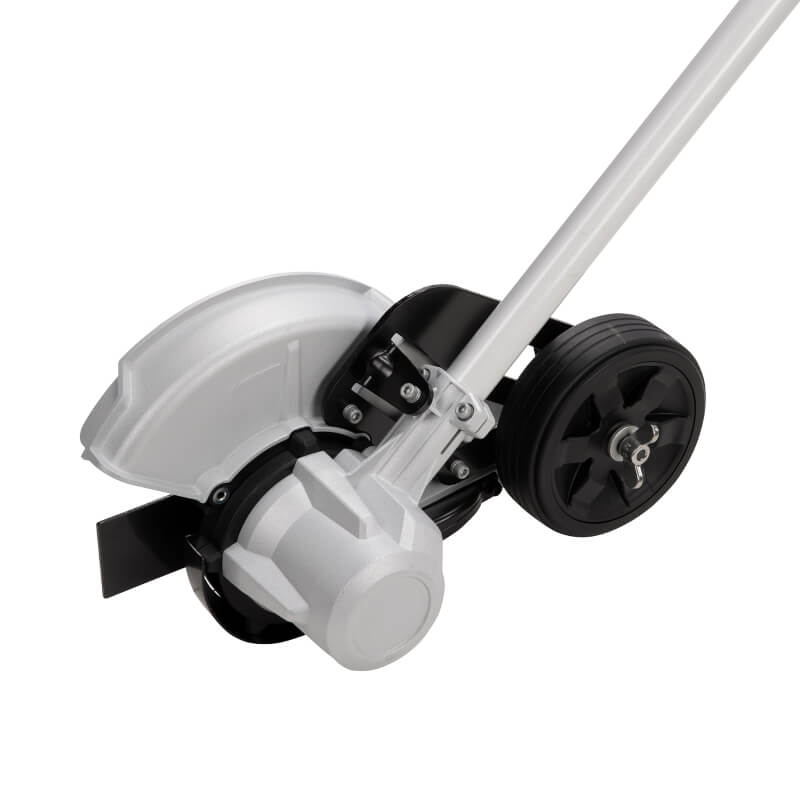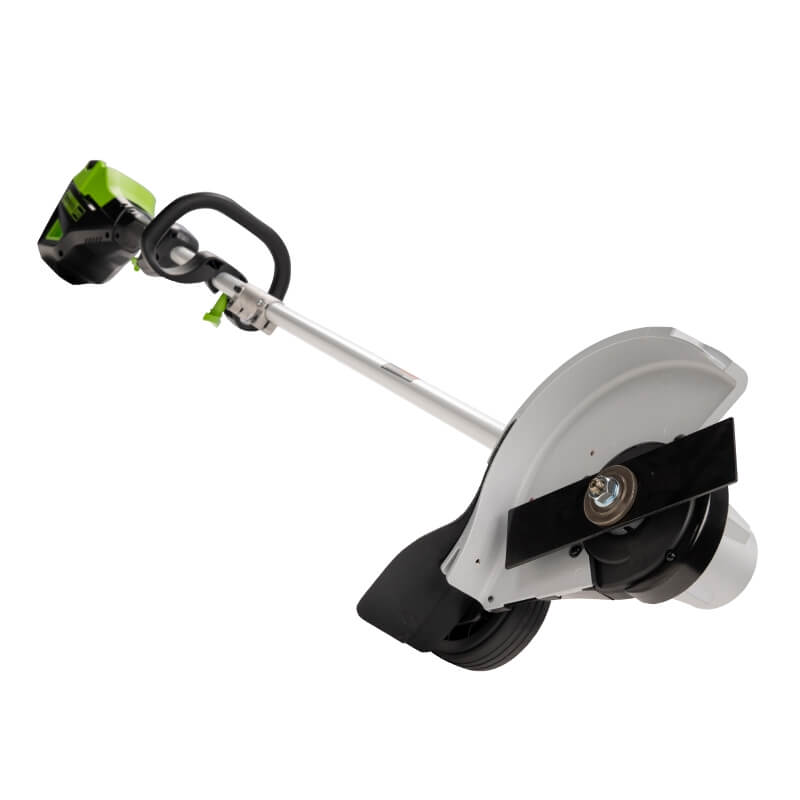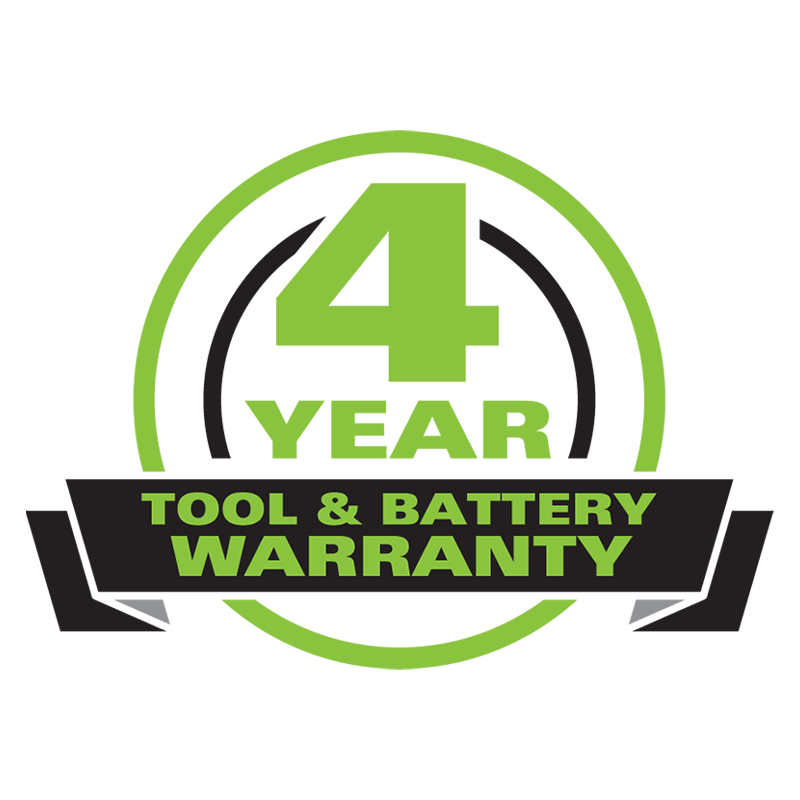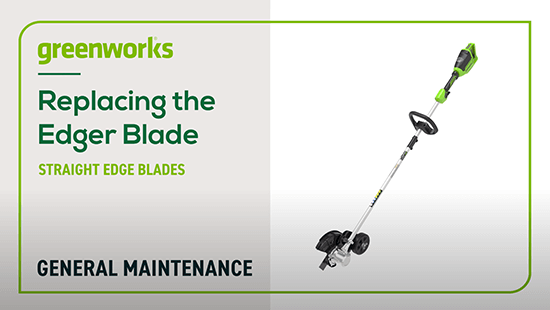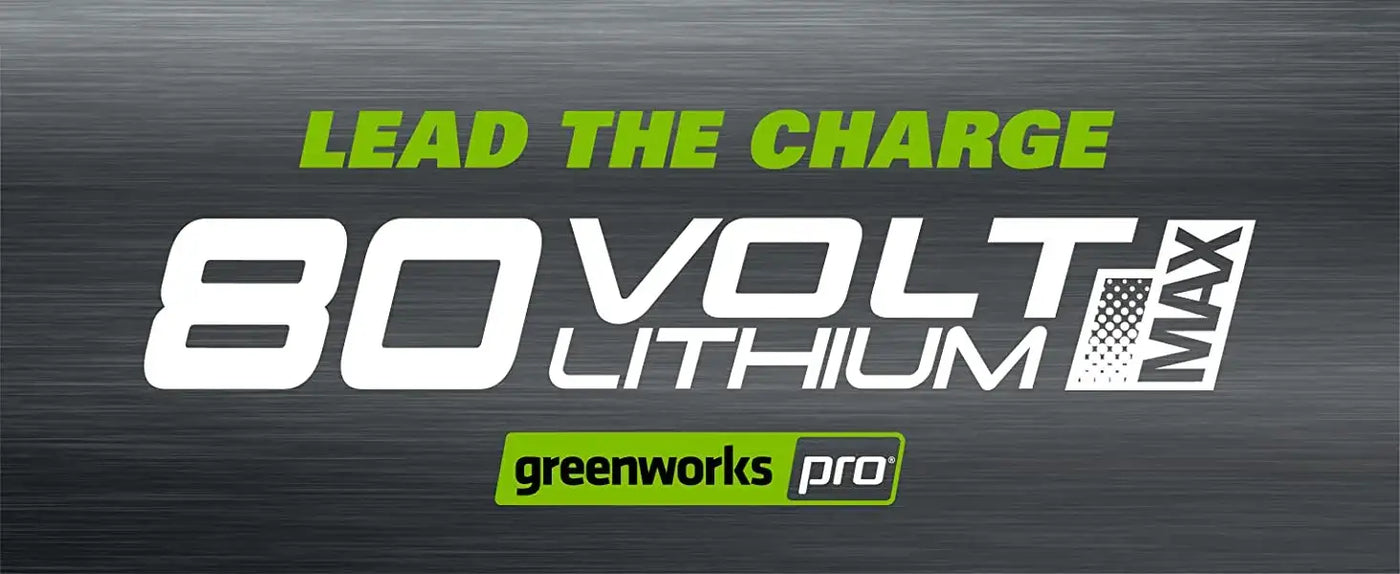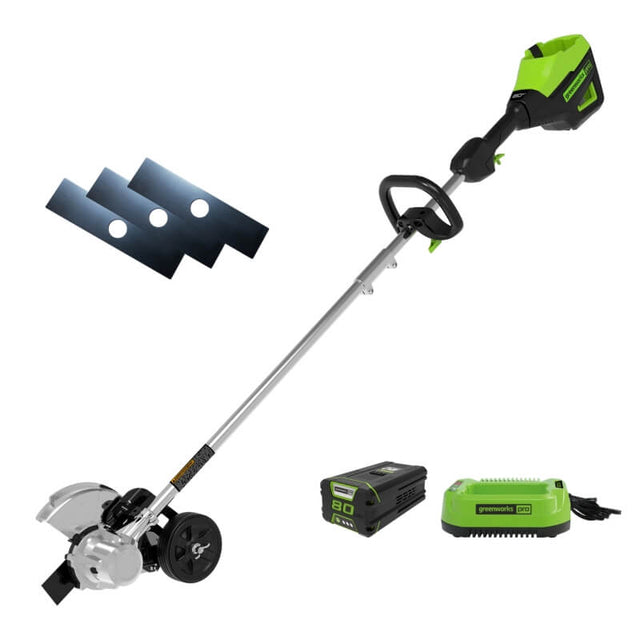Coupe-bordure 80 V, 8 pouces, avec 3 lames supplémentaires, batterie 4,0 Ah et chargeur
Coupe-bordure 80 V, 8 pouces, avec 3 lames supplémentaires, batterie 4,0 Ah et chargeur est en rupture de stock et sera expédié dès qu’il sera de retour en stock.
Available At:

Garantie
Garantie
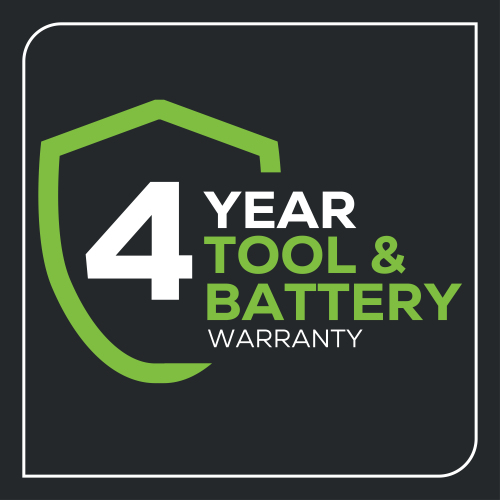
Compatible With :
Description
Description
Le coupe-bordure Greenworks 80 volts 8 pouces, avec sa conception légère, crée des lignes épurées autour de votre allée, allées, parterres de fleurs et patio. Il est révolu le temps où vous teniez votre coupe-bordure incliné pendant que vos bras se fatiguaient en essayant d'obtenir ces lignes parfaites. Mieux encore, cette déligneuse démarre facilement à chaque fois en appuyant simplement sur un bouton.
Manuels
Manuels
Vidéos de produits
Foire aux questions
Foire aux questions
- Do your edgers do angle cuts?
- Can I use my string trimmer to edge?
- Can I use my edger to cut grass/weeds?
- Can I use this edger on both pavement and grass?
- Do I need to push this unit?
- Which way does the blade rotate?
- How deep does your unit go?
- Could I use a larger blade for greater depth?
- Can this edger use other attachments?
- What is the purpose of an edger?
- Can I leave my battery in the charger after charging it?
- Why do batteries cost so much more than the tool?
- How do I store the battery? Can I leave the battery in the garage or shed?
- My battery is stuck in my tool. How do I get it out?
- How do I check the charge on my battery?
- Can I use any Greenworks battery in any Greenworks tool?
- Are there certain tools that can’t accept all same voltage batteries?
- Do all batteries of the same voltage use the same charger?
- Does battery temperature matter?
- The charger indicates that my battery is fully charged but I was just using it and it depleted. Why isn’t it charging?
- My charger is flashing red when I engage my battery. Why is this happening?
- My charger has a solid red light on it when I engage my battery. What is happening?
- Are your chargers made for 220V or 120V outlets?
Our edgers can only cut vertically, straight up and down. The front wheel can be adjusted to allow a deeper or shallower cut, and to increase the life of the blade. The edger blade can be adjusted to depths that allow for either lawn edging or for trenching.
All string trimmers can be used to edge. Adjust your grip so the head is tilted by 90 degrees and the string now spins along the vertical axis. The unit will now function as an edger.
No, if this unit is listed as an edger unit it cannot be used to trim grass/weeds. You would need to look at our string trimmer units for this function.
Yes, the wheels are adjustable, and you can use it to edge grass around pavemented areas and grassed areas.
Yes, our edgers are not self-propelled. The edgers are stand behind push units.
The edgers blade strike downwards in a clockwise direction.
The maximum depth for our 8-inch edgers is up to 4-inches depending on the curb height.
Due to the design of the guard, a larger blade cannot be accommodated.
Currently, none of our designated edgers are attachment capable.
Edgers are used to trim and cut around the edge of driveways, sidewalks, flower beds and other similar areas.
The battery chargers do have auto cut offs to prevent it from over charging. However, we do advise customers to remove the battery from the charger after it has been fully charged and to also unplug the charger from the outlet, as this is good electrical safety practice to do so. This will also help to prevent false defect readings and allows the charger to reset itself each time it’s used to charge a battery.
The battery is the most important component for a battery-operated unit. Please be assured we price our batteries with the cost of material, manufacturing, and current market pricing in mind. Batteries are the costliest items to manufacture and ship in any kit. Full kits including a tool, battery, and charger are priced affordably so that consumers can begin building that line of tools and move forward purchasing tool-only units. When you purchase batteries on their own, it is more notable the cost that they carry.
When the battery is not in use, we suggest storing it indoors, in a cool dry area - away from direct sunlight. Leave the charger unplugged and the battery disconnected from the charger unless it needs charging. It is recommended to store the battery with a full charge, and if it is being stored for a period where no use is expected, to check on the charge every couple of months. If you notice the charge has dropped, we advise charging the battery back up to full before returning it to its safe storage place. Following these steps will ensure you receive the most out of the battery life.
60V/ 80V Products: To remove the battery, push and hold the battery release button. Then, pull the battery pack straight out. In some cases, if the springs underneath have gotten locked down you might have to give a small push to the top of the battery to re-engage them to help the battery pop up. The battery pack fits snugly into the product to prevent accidental dislodging while in use; it may require a strong pull to remove. Before use, be sure that the rails on the battery and product are free of debris that could cause the battery to get stuck. 24V/ 40V Products: To remove the battery, press the latch button on the battery pack down and hold. Pull the battery pack out of the handle. The battery pack fits snugly into the product to prevent accidental dislodging while in use; it may require a strong pull to remove. Before use, be sure that the rails on the battery and product are free of debris that could cause the battery to get stuck.
Press the battery capacity indicator (BCI) button located at the end of the battery. The lights will illuminate according to the battery capacity level. Please note this switch does require a firm direct push using the tip of your finger. If the button is not being fully engaged, the lights will not activate. Please also be advised the lights only stay on for a few seconds and will automatically turn off. Another reason the lights will not power on is if the battery is completely depleted of power and needs to be charged.
Our batteries are interchangeable with tools that are of the same voltage platform only. The difference between batteries of the same voltage is the ampere-hour (Ah) rating. The higher the ampere-hour (Ah) rating on the battery is the more run time it has to offer.
There are a few exceptions. • Our 80V 20” snow thrower models 2600402 / 2605202 / 2601302 manufactured prior to September of 2017 can only use 2.0Ah or 2.5Ah battery models. • Our 60V 8.0Ah battery model 2957102 cannot be used in the following tools due to the height: dual-port lawnmowers, pressure washers, or the wet/dry vacuum.
Yes, they do. Each product line has designated charger models that can charge all batteries in that voltage platform, no matter the Ah rating.
The temperature of the battery prior to use should not be too warm or too cold. For snow throwers if the battery is too cold it may not be operatable. Allow the battery to get to room temperature prior to use. For our other tools allow the battery to cool down prior to use if it’s too warm. To avoid battery temperature issues, batteries should be stored indoors in a dry and cool location. Information on battery storage and temperature will in inside your owner’s manual.
Putting a battery that was just in use onto the charger often results in a false full charge signal. Remove the battery from the charger and allow it to rest in a room temperature area for approximately 10-15 minutes before charging.
When the battery is inserted into the charger and the status LED blinks red, remove the battery from the charger for 1 minute, then reinsert. If the status LED blinks green, then the battery is properly charging. If the status LED is still blinking red, remove the battery and unplug the charger for 1 minute. After 1 minute, plug in the charger and reinsert the battery. If the status LED blinks green, then the battery is properly charging. If the status LED is still blinking red, then this likely indicates an issue with the battery or charger and should be taken care of either with our warranty team or by means of replacement.
This typically indicates that the battery is at the wrong temperature to be charged. Allow the battery and charger to rest indoors at room temperature until they are no longer hot/cold and attempt charging again.
Greenworks chargers sold in the USA and Canada are designed for use on 120V outlets only.

